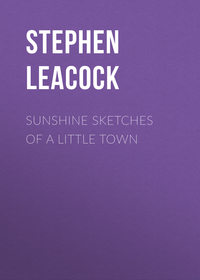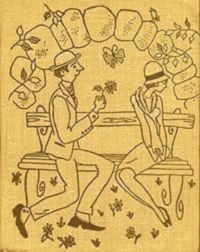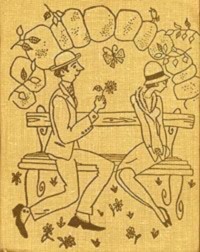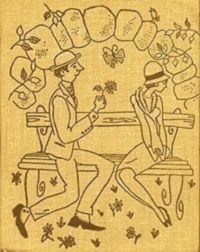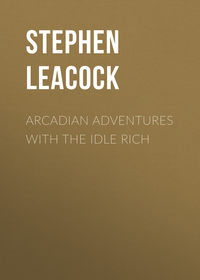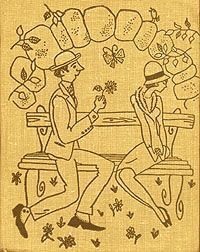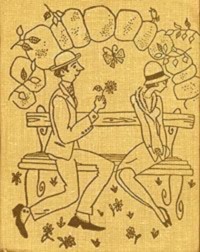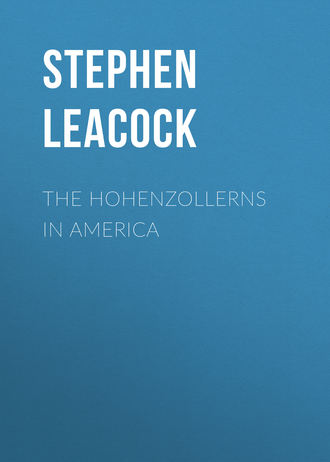 полная версия
полная версияThe Hohenzollerns in America
It was very dreadful when they came to take him. I was so glad that Uncle William was not here to see it all. But it was in the morning and he had gone out to see a steamship company about being president of it, and I was tidying up our rooms, because Mrs. O'Halloran won't tidy them up any more or let the coloured servant tidy them up until we pay her more money. She said that to me, but I think she is afraid to say it to Uncle William. So I mean to do the work now while Uncle is out and not let him know.
This morning, in the middle of the morning, while I was working, all of a sudden I heard the street door open and slam and some one rushing up the stairway: and then Cousin Willie broke into the room, all panting and excited, and his face grey with fright and gasping out, "Hide me, hide me!" He ran from room to room whining and hysterical, and his breath coming in a sort of sob, but he seemed incapable of deciding what to do. I would have hidden him if I could, but at the very next moment I heard the policemen coming in below, and the voice of the landlady. Then they came upstairs, big strong-looking men in blue, any one of whom could have choked Cousin Willie with one hand. Cousin Willie ran to and fro like a cornered rat, and two of the men seized him and then I think he must have been beside himself with fear for I saw his teeth bite into the man's hand that held him, and one of the policemen struck him hard with his wooden club across the head and he fell limp to the floor. They dragged him down the stairway like that and I followed them down, but there was nothing that I could do. I saw them lift Cousin Willie into a closed black wagon that stood at the street door with quite a little crowd of people gathered about it already, all excited and leering as if it were a show. And then they drove away with him and I came in and went upstairs and sat down in Uncle's room but I could not work any more. A little later on Mr. Peters came to the house,—I don't know why, because it was not for the ice as he had his other clothes on,—and he came upstairs and sat down and told me about what had happened. It seemed a strange thing to receive him upstairs in Uncle's bedroom like that, but I was so upset that I did not think about it at the time. Mr. Peters had been on our street with his ice wagon when the police came, though I did not see him. But he saw me, he said, standing at the door. And I think he must have gone home and changed his things and come back again, but I did not ask him.
He told me that Cousin Willie had stabbed a man, or at least a boy, that was in charge of a jewelry shop, and that the boy might die. Cousin Willie, Mr. Peters says, has been stealing jewelry nearly ever since we came here and the police have been watching him but he did not know this and so he had grown quite foolhardy, and this morning in broad daylight he went into some sort of jewelry or pawn shop where there was only a boy watching the shop, and the boy was a cripple. Cousin Willie had planned to hide the things under his coat and to sneak out but the boy saw what he was doing and cried out, and when Cousin Willie tried to break out of the shop he hobbled to the door and threw himself in the way. And then it was that Cousin Willie stabbed him with his sheath-knife,—the one that I had seen in his room,—and ran. But already there was a great outcry and the people followed on his tracks and shouted to the police, and so they easily ran him down.
All of this Mr. Peters told me, but he couldn't stay very long and had to go again. He says he is going to see what can be done for Cousin Willie but I am afraid that he doesn't feel very sorry for him; but after Mr. Peters had gone I could not help going on thinking about it all and it seemed to me as if Cousin Willie had not altogether had a fair chance in life. Common people are brought up in fear of prison and punishment and they learn to do what they should. But Cousin Willie was brought up as a prince and was above imprisonment and things like that. And in any case he seemed, when the big men seized hold of him, such a paltry and miserable thing.
Later on in the day Uncle William came home and I had to tell him all about Cousin Willie. I had feared that he would be dreadfully upset, but he was much less disturbed than I had thought. Indeed it is quite wonderful the way in which Uncle can detach his mind from things.
I told him that Mr. Peters had said that Cousin Willie must go to Sing-Sing, and Uncle said, "Ha! a fortress?" So I told him that I thought it was. After that he asked if Cousin Willie was in his uniform at the time, and when I said that he was not, Uncle said "That may make it more difficult." Of course Cousin Willie has no uniform here in America and doesn't wear any, but I notice that Uncle William begins to mix up our old life with our life here and seems sometimes quite confused and wandering; at least other people would think him so. He went on talking quite a long time about what had happened and he said that there is an almost exact precedent for the "incident" (that's what he calls it) in the Zabern Case. I don't remember much about that, as it was years ago, before the war, but Uncle William said that it was a similar case of an officer finding himself compelled to pass his sword once through a cripple (only once, Uncle says) in order to clear himself a way on the sidewalk. Uncle quoted a good many other precedents for passing swords through civilians, but he says that this is the best one.
In the evening Cousin Ferdinand and Uncle Henry came over. Uncle Henry seemed very gloomy and depressed about what had happened and said very little, but Cousin Ferdinand was very much excited and angry. He said what is the good of all his honesty and his industry if he is to be disgraced like this: he asked of what use is his uprightness and business integrity if he is to have a first cousin in Sing-Sing. He said that if it was known that he had a cousin there it would damage him with his best trade to an incalculable extent. But later on he quieted down and said that perhaps with a certain part of his trade it would work the other way. Uncle Ferdinand has grown to be much interested in what is called here "advertising,"—a thing that he says all kings ought to study—and he decided, after he had got over his first indignation, that Cousin Willie being in Sing-Sing would be a very good advertisement for him. It might bring him, he said, quite a lot of new business; especially if it was known that he refused to help Cousin Willie in any way or to have anything more to do with any of the rest of us, and not to give us any money. He said that this was a point of view which people could respect and admire.
So before he went home he said that we must not expect to see or hear from him any more, unless, of course, things should in some way brighten up, in which case he would come back.
CHAPTER V
It is a long time—nearly three months—since I have added anything to my memoirs. The truth is I find it very hard to write memoirs here. For one thing nobody else seems to do it. Mrs. O'Halloran tells me that she never thinks of writing memoirs at all. At the Potsdam palace it was different. We all wrote memoirs. Eugenia of Pless did, and Cecilia did, and I did, and all of us. We all had our memoir books with little silver padlocks and keys. We were brought up to do it because it helped us to realise how important everything was that we did and how important all the people about us were. It was wonderful to realise that in the old life one met every day great world figures like Prince Rasselwitz-Windischkopf, the Grand Falconer of Reuss, and the Grand Duke of Schlitzin-Mein, and Field Marshall Topoff, General-in-Chief of the army of Schwarzburg-Rudolstadt. There are no such figures as these in America.
But another reason for not writing has been that things have been going so badly with us. Uncle William still has no work and he seems to be getting older and more broken and stranger in his talk every day. He is very shabby now in spite of all I can do with my needle, but he becomes more grandiloquent and consequential all the time. Some of the mean looking young men at this boarding house have christened him "The Emperor"—which seems a strange thing for them to have picked upon, and they draw him out in his talk, and when they meet him they make mock salutes to him which Uncle returns with very great dignity. Quite a lot of the people on the nearby streets have taken it up and when they see Uncle come along they make him military salutes. Uncle gets quite pleased and flushed as he goes along the street and answers the salutes with a sort of military bow.
He is quite happy when he is out of doors explaining to me with his stick the plans he has for rebuilding New York and turning the Hudson River to make it run the other way. But when he comes in he falls into the most dreadful depression and sometimes at night I hear him walking up and down in his room far into the night. Two or three times he has had the same dreadful kind of seizures that he had on board the ship when we came over, and this is always when there is a great wind blowing from the ocean and a storm raging out at sea.
Of course as Uncle has not any work or any position, we are getting poorer and poorer. Cousin Willie has been sent to the fortress at Sing-Sing and Cousin Ferdinand of Bulgaria refuses to know us any more, though, from what we hear, he is getting on wonderfully well in the clothing business and is very soon to open a big new store of which he is to be the general manager. Cousin Karl is now the Third Assistant Head-Waiter at the King George Hotel, and in the sphere in which he moves it is impossible for him to acknowledge any relationship with us. I don't know what we should do but that Uncle Henry manages to give us enough of his wages to pay for our board and lodging. Uncle Henry has passed his Naval Examination and is now appointed to a quite high command. It is called a Barge Master. They refused to accept his certificate of a German Admiral, so he had to study very hard, but at last he got his qualification and is now in charge of long voyages on the canals.
I am very glad that Uncle Henry's command turned out to be on canals instead of on the high seas, as it makes it so much more German. Of course Uncle Henry had splendid experience in the Kiel Canal all through the four years of the war, and it is bound to come in. So he goes away now on quite long voyages, often of two or three weeks at a time, and for all this time he is in chief charge of his barge and has to work out all the navigation. Sometimes Uncle Henry takes bricks and sometimes sand. He says it is a great responsibility to feel oneself answerable for the safety of a whole barge-full of bricks or sand. It is quite different from what he did in the German navy, because there it was only a question of the sailors and for most of the time, as I have heard Uncle William and Uncle Henry say, we had plenty of them, but here with bricks and sand it is different. Uncle Henry says that if his barge was wrecked he would lose his job. This makes it a very different thing from being a royal admiral.
But Uncle William all through the last three months has failed first at one thing and then at another. After all his plans for selling pictures had come to nothing he decided, very reluctantly that he would go into business. He only reached this decision after a great deal of anxious thought because, of course, business is a degradation. It involves taking money for doing things and this, Uncle William says, no prince can consent to do. But at last, after deep thought, Uncle said, "The die is cast," and sat down and wrote a letter offering to take over the presidency of the United States Steel Corporation. We spent two or three anxious days waiting for the answer. Uncle was very firm and kept repeating, "I have set my hand to it, and I will do it," but I was certain that he was sorry about it and it was a great relief when the answer came at last—it took days and days, evidently, for them to decide about it—in which the corporation said that they would "worry along" as they were. Uncle explained to me what "worrying along" meant and he said that he admired their spirit. But that ended all talk of his going into business and I am sure that we were both glad.
After that Uncle William decided that it was necessary for me to marry in a way to restore our fortunes and he decided to offer me to a State Governor. He asked me if I had any choice of States, and I said no. Of course I should not have wished to marry a state governor, but I knew my duty towards Uncle William and I said nothing. So Uncle got a map of the United States and he decided to marry me to the Governor of Texas. He told me that I could have two weeks to arrange my supply of household linen and my trousseau to take to Texas, and he wrote at once to the Governor. He showed me what he wrote and it was a very formal letter. I think that Uncle's mind gets more and more confused as to where he is and what he is and he wrote in quite the old strain and I noticed that he signed himself, "Your brother, William." Perhaps it was on that account that we had no answer to the letter. Uncle seemed to forget all about it very soon and I was glad that it was so, and that I had escaped going to the court of Texas.
All this time Mr. Peters has been very kind. He comes to the house with his ice every day and sometimes when Uncle Henry is here he comes in with him and smokes in the evenings. One day he brought a beautiful bunch of chrysanthemums for Uncle William, and another day a lovely nosegay of violets for Uncle Henry. And one Sunday he took us out for a beautiful drive with one of his ice-horses in a carriage called a buggy, with three seats. Uncle William sat with Mr. Peters in the front seat, and Uncle Henry and Cousin Ferdinand (it was the last time he came to see us) sat behind them and there was a little seat at the back in which I sat. It was a lovely drive and Uncle William pointed out to Mr. Peters all the things of interest, and Cousin Ferdinand smoked big cigars and told Uncle Henry all about the clothing trade, and I listened to them all and enjoyed it very much indeed. But I was afraid afterwards that it was a very bold and unconventional thing to do, and perhaps Mr. Peters felt that he had asked too much because he did not invite me to drive again.
But he is always very kind and thoughtful.
One Sunday afternoon he came to see us, thinking by mistake that Uncle William and Uncle Henry were there, but they weren't, and his manner seemed so strange and constrained that I was certain that there was something that he was trying to say and it made me dreadfully nervous and confused. And at last quite suddenly he said that there was something that he wanted to ask me if I wouldn't think it a liberty. My breath stopped and I couldn't speak, and then he went on to ask if he might lend us twenty-five dollars. He got very red in the face when he said it and he began counting out the money on the sofa, and somehow I hadn't expected that it was money and began to cry. But I told Mr. Peters that of course we couldn't think of taking any money, and I begged him to pick it up again and then I began to try to tell him about how hard it was to get along and to ask him to get work for Uncle William, but I started to cry again. Mr. Peters came over to my chair and took hold of the arm of it and told me not to cry. Somehow his touch on the arm of the chair thrilled all through me and though I knew that it was wrong I let him keep it there and even let him stroke the upholstery and I don't know just what would have happened but at that very minute Uncle William came in. He was most courteous to Mr. Peters and expressed his apologies for having been out and said that it must have been extremely depressing for Mr. Peters to find that he was not at home, and he thanked him for putting himself to the inconvenience of waiting. And a little while after that Mr. Peters left.
The Next Day
Mr. Peters came back this morning and said that he had got work for Uncle William. So I was delighted. He said that Uncle will make a first class "street man," and that he has arranged for a line of goods for him and that he has a "territory" that Uncle can occupy. He showed me a flat cardboard box filled with lead pencils and shoe-strings and little badges and buttons with inscriptions on them, and he says these are what is called a "line," and that Uncle can take out this line and do splendidly. I don't quite understand yet who makes the appointment to be a street man or what influence it takes or what it means to have a territory, but Mr. Peters explained that there is a man who is retiring from being a street man and that Uncle can take his place and can have both sides of the Bowery, which sounds very pretty indeed.
At first I didn't understand—because Mr. Peters hesitated a good deal in telling me about it—that if Uncle gets this appointment, it will mean that he will sell things in the street. But as soon as I understood this I felt that Uncle William would scorn to do anything like this, as the degradation would be the same as being President of the Steel Corporation. So I was much surprised to find that when Uncle came in he didn't look at it that way at all. He looked at the box of badges and buttons and things, and he said at once, "Ha! Orders of Distinction! An excellent idea." He picked up a silly little white button with the motto "Welcome to New York," and he said "Admirable! That shall be the first class." And there was a little lead spoon with "Souvenir of the Bowery" that he made the second class. He started arranging and rearranging all the things in the box, just as he used to arrange the orders and decorations at the Palace. Only those were REAL things such as the Order of the Red Feather, and The Insignia of the Black Duck, and these were only poor tin baubles. But I could see that Uncle no longer knows the difference, and as his fingers fumbled among these silly things he was quite trembling and eager to begin, like a child waiting for to-morrow.
CHAPTER VI
It is a year or nearly a year since I wrote in my memoirs, and I only add to them now because things have happened which mean that I shall never write any more.
Mr. Peters and I were married last autumn. He asked me if I would marry him the day that he held the arm of my chair in the boarding house where we used to live. At first I never thought that Uncle William would permit it, because of the hopeless difference of birth. But it turned out that there was no difficulty at all. Uncle's mind was always so wonderful that he could find a way out of anything provided that he wanted to. So he conferred on Mr. Peters an Order that raised him right up in birth so that he came level with me. Uncle said that he could have lifted him higher still if need be but that as I was only, in our old life, of a younger branch of the family, it was not necessary to lift Mr. Peters to the very top. He takes precedence, Uncle said, just below Uncle Henry of Prussia and just above an Archbishop.
It is so pleasant to think—now that poor Uncle William is gone—that my marriage was with his full consent.
But even after Uncle William had given his formal consent, I didn't want to get married till I could leave him safely. Only he got along so well in his "territory" of the Bowery from the very start that he was soon quite all right. He used to go out every morning with his trayful of badges and pencils and shoe-strings and he was a success at once. All the people got to know him by sight and they would say when they saw him, "Here comes the Emperor," or "Here comes Old Dutch," and very often there would be quite a little crowd round him buying his things. Uncle regarded himself always as conferring a great dignity on any one that he sold a badge to, but he was very capricious and he had certain buttons and badges that he would only part with as a very special favour and honour. Uncle got on so fast that presently Cousin Ferdinand decided that it would be all right to know him again and so he came over and made a reconciliation and took away Uncle's money,—it was all in small coins,—in a bag to invest for him.
So when everything was all right with Uncle William, Mr. Peters and I were married and it was on our wedding morning that Uncle conferred the Order on my husband which made me very proud. That was a year ago, and since then we have lived in a very fine place of our own with four rooms, all to ourselves, and a gallery at the back. I have cooked all the meals and done all the work of our apartment, except just at the time when our little boy was born. We both think he is a very wonderful child. At first I wanted to call him after the Hohenzollerns and to name him William Frederick Charles Mary Augustus Francis Felix, but somehow it seemed out of place and so we have called him simply Joe Peters. I think it sounds better. Uncle William drew up an act of abnegation of Joe, whereby he gives up all claim to a reversion of the throne of Prussia, Brunswick and Waldeck. I was sorry for this at first but Uncle said that all the Hohenzollerns had done it and had made just as great a sacrifice as Joe has in doing it. But my husband says that under the constitution of the United States, Joe can be President, which I think I will like better.
It was one day last week that Uncle William met with the accident that caused his death. He had walked far away from his "territory" up to where the Great Park is, because in this lovely spring weather he liked to wander about. And he came to where there was a great crowd of people gathered to see the unveiling of a new monument. It is called the Lusitania Monument and it is put up in memory of the people that were lost when one of our war boats fought the English cruiser Lusitania. There were a lot of soldiers lining the streets and regiments of cavalry riding between. And it seems that when Uncle William saw the crowd and the soldiers he was drawn nearer and nearer by a sort of curiosity, and when he saw the great white veil drawn away from the monument, and read the word "Lusitania" that is carved in large letters across the base, he screamed out in a sudden fear, and clashed among the horses of the cavalry and was ridden down.
They carried him to the hospital, but he never spoke again, and died on the next day but one. My husband would not let me go to see him, as he was not conscious and it could do no good, but after Uncle William was dead they let me see him in his coffin.
Lying there he seemed such a pitiful and ghastly lump of clay that it seemed strange that he could, in his old life, have vexed the world as he did.
I had thought that when Uncle William died there would have been long accounts of him in the papers; at least I couldn't help thinking so, by a sort of confusion of mind, as it is hard to get used to things as they are and to remember that our other life is unknown here and that we are known only as ourselves.
But though I looked in all the papers I could find nothing except one little notice, which I cut out of an evening paper and which I put in here as a conclusion to my memoirs.
THE "EMPEROR" DEAD
Unique Character of the East Side Passes Away
A unique and interesting character, a familiar figure of the East Side of the City, has been lost from our streets with the death of William Hohen lost Thursday in the Pauper Hospital, to which he had been brought as the result of injuries sustained in a street accident at the Lusitania celebration. Hohen, who was about sixty-five years of age, was an immigrant out of Germany after the troubles of the Great War. He had been for a year or more a street pedler on the Bowery, where he sold souvenir buttons and various little trinkets. The old man appears to have been the victim of a harmless hallucination whereby he thought himself a person of Royal distinction and in his fancy converted the box of wares that he carried into Orders of Chivalry and decorations of Knighthood. The effect of this strange fancy was heightened by an attempt at military bearing which, comic though it was in so old and ragged a figure, was not without a touch of pathos. Some fancied resemblance to the former Kaiser had earned for Hohen the designation of the "Emperor," of which he appeared inordinately proud. But those who knew Hohen by sight assure us that the resemblance to the former ruler of Germany, who with all his faults made a splendid and imposing appearance, was of a purely superficial character. It would, alas! have been well for the world if the lot of William Hohenzollern had fallen on the lines of the simple and pathetic "Emperor" of the Bowery.


